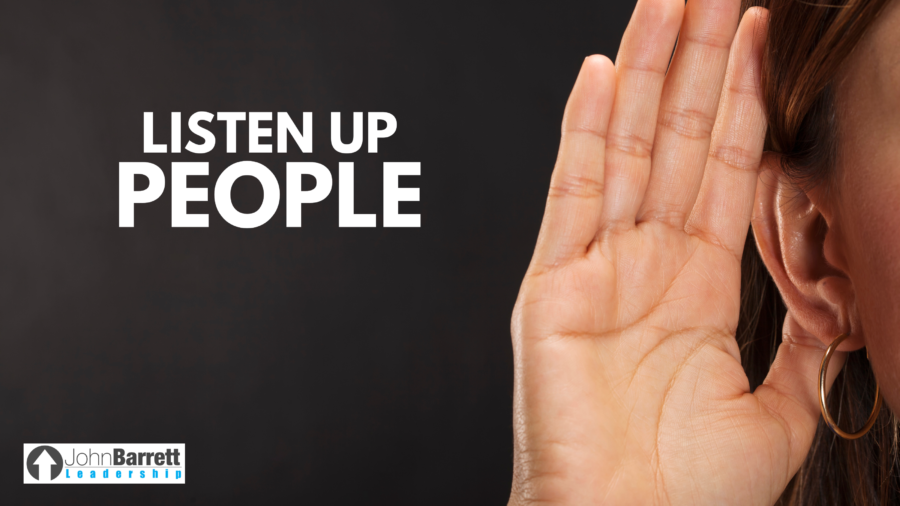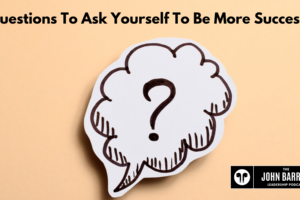Listen Up People
You can’t lead people if you’re always trying to impress them. One of the ways we try to impress others is by talking…a lot. It is a sign of insecurity to be the one doing all the talking. Secure leaders are very comfortable leaning in and listening to others. The more you lean in and listen, the more impact you have on people. And when you move from trying to impress people to trying to impact them, you activate your greatest influence.
One of the most powerful ways a leader can empower others is by listening to them. The more you listen to another person, the more they feel valued by you. When others believe they have a voice, they feel they have a place. It was President Theodore Roosevelt who was credited with saying these timeless words: “No one cares how much you know until they know how much you care.”
The greatest leaders lead by listening. Woodrow Wilson said, “The ear of the leader must ring with the voices of the people.” Leaders are not always the first ones to speak up. However, they are the first ones to listen to what the people are saying. This equips them with the knowledge to then speak up and act accordingly. We are meant to believe that leaders magically know what to do without ever having to listen to the needs of the people, but great leadership is actually the complete opposite. Leaders know what to do BECAUSE they have listened to the needs of the people. It is only by mastering the art of observing that leaders are able to move progress forward. Never forget this powerful truth: A leader who never listens is a leader who will never be listened to.
It’s been said that God gave us two ears and one mouth for a reason: to listen twice as much as we talk. A person will never gain the respect of others if they cannot listen. Listening is more than just hearing, though. Hearing is the physical act of gathering information through the ears. Listening is the mental processing and emotional understanding of the information we take in. To listen well, you must be fully present in the moment, absorbing both the verbal and nonverbal cues of the person before you. Listening is the awareness of body language, tone, eye contact, and the conceptual context accompanying what is being said. Listening this way, you can truly know the heart of the person speaking to you. Businessman Peter Drucker said, “The most important thing in communication is to hear what isn’t being said.”
Here are three quick tips to be a better listener as a leader:
1) Slow Down
Don’t be in a hurry to get your agenda out and move on. Give people an opportunity to express themselves while you engage them. It’s amazing what you can find out when you slow down enough to actually let someone else talk. When dealing with tasks, move fast; when dealing with people, move slow. On a side note, do not knee-jerk react to people’s words and actions. Slow down enough to gather yourself before responding out of emotion, it’s not worth losing your influence over. Telling someone what to do isn’t leading them. Leading people is about working together towards progress. People always support what they help create, so include them in the process. Stephen Covey said, “When you really listen to another person from their point of view, and reflect back to them that understanding, it’s like giving them emotional oxygen.”
2) Ask Questions
Lead with questions. There’s no better way to truly value someone than to ask them their opinions and thoughts. If you find yourself doing all the talking with your team, you’re not leading, you’re blocking engagement. For every moment you are talking, someone else is not able to. Always lead with questions more than you do answers. Remember this truth: Answers Direct–Questions Develop. And leadership is not so much about directing people as it is about developing them. The more you develop your people, the higher you will go, they will go, and your organization will go! I am not saying to be silent; I am just saying to keep your communication in balance. Remember, communication is about two or more people conversing, not you monologuing. Susan Wong, Financial Analyst for Apple said, “Good leaders understand boundaries and are willing to accept sound advice from followers.”
3) Focus On Them
Connection requires disconnection. You connect with people by disconnecting from your selfishness. Do not be enticed to weave yourself into people’s stories. I am tempted to do this all of the time in conversations I have with people. Just the other day an individual was telling me a story about their vacation to the beach. Guess what I wanted to do? I wanted to tell them about my vacation at the beach! I cut them off and started to revolve the whole conversation around my trip, and what I did, where I went to eat, how I did this and that, and on and on. I hijacked the conversation by telling them my story rather than listening to their story. No one likes to be cut off or “upped one” as though their topic wasn’t important enough to talk about. To influence others, focus on them, not on yourself. Weaving your stories over the top of someone else’s stories only leads to disconnecting with them.
You won’t lead if you can’t listen. Make sure you become a listening type of leader and you’ll gain more and more influence with others.









